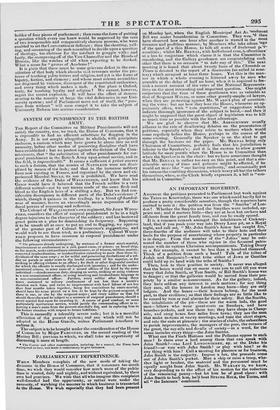SYSTEM OF PUNISHMENT IN THE BRITISH ARMY.
THE Report of the Committee on Military Punishments will not satisfy the country, nor, we trust, the House of Commons, that it
is impossible to find an efficient substitute for flogging in the
Army. It is not sought altogether to abolish, with precipitate rashness, a custom which may have grown by abuse into an evil necessity, before other modes of presersing discipline shall have
been established : but we protest against the dictum of the Com- missioners, that " the substitution of other punishments for cor-
poral punishment in the British Army upon actual service, and in
the field, is impracticable." It seems a sufficient d priori answer to such a dictum, that the armies of NAPOLEON were not disci-
plined by means of the lash; and that in the immense military force now existing in France, and organized by the stern and ex- perienced Marshal SOULT, its use is prohibited. We have read the evidence of the Duke of WELLINGTON, and know that his Grace would have it believed that the French soldier is a very different animal—not by any means made of the same flesh and
blood as the English hero of a shilling a day. But we find con- siderable discrepancy in different parts of the Duke's evidence ;* which, though it gruuses in the reading, by a blunt off-handed- ness of manner, leaves an exceedingly mean impression of the ducal powers of reasoning and reflection.
The Colonel of WEL.LINGTON'S own regiment, Sir JOHN Woon- roan, considers the effect of corporal punishment to be in a high degree injurious to the character of the soldiery ; and has bestowed great pains on a plan for diminishing its frequency. Supposing it to be unsafe all at once to put an end to flogging, we approve of the greater part of Colonel WOODFORD'S suggestions, and -would wish to see them tried, as a preliminary. Colonel Woon- FORD proposes to have recourse to corporal punishment under the following circumstances-
. " Oa prisoners already undergoing, by sentence of a former court-martial, imprisonment or confinement in a cell, guard-room, or prison; on board ship,
on the march, under extraordinary circumstances, as of treason, sedition, mutiny, concerted insubrodination, or insubordination extending to more than three in- dividuals of the same corps ; or for wilful and persevering disobedience of a sol- dier on parade or under arms to the lawful command of his superior, or for
striking or offering violence to an officer ; for theft or other disgraceful conduct for which the offender is usually discharged with ignominy ; and for the under- mentioned crimes, in some cases of a second offence of the kind by the same
individual :—drunkenness on duty, sleeping on sentry, striking or using violence to a non-commissioned officer, or using insulting and insubordinate language to
S non-commissioned officer. Further, every soldier after being three times sentenced to solitary confinement of not less than a month's duration each time, and twice to imprisonment with hard labour of not less than four months taken together, being five convictions by court-martial,
should have his name placed on a list, to be kept by the provost-sergeant, if there is one, or else by the sergeant-major; and every soldier on that list
should thenceforward be subject to a sentence of corporal punishment, should a court-martial find cause for awarding it. A course of good conduct, or some particularly meritorious service, would justify the commanding officer in re. moving a man's name from the provost-marshal's list, and in replacing him in his former situation with respect to future liabilities."
This is assuredly a tolerably severe code; but it is a merciful alleviation of the present system; and one which will not he adopted at the Horse Guards, unless Parliament interferes to enforce it.
The subject is to be brought under the consideration of the House -of Commons by Major FANCOURT, on the second reading of the Mutiny Bill ; previous to which, we shall take an opportunity of discussing it more at length.
• The Cuvrier and other contemporaries, including. for a marvel, the Times, have rioticipared us hew, and made it unnecessary to give instances.


























 Previous page
Previous page